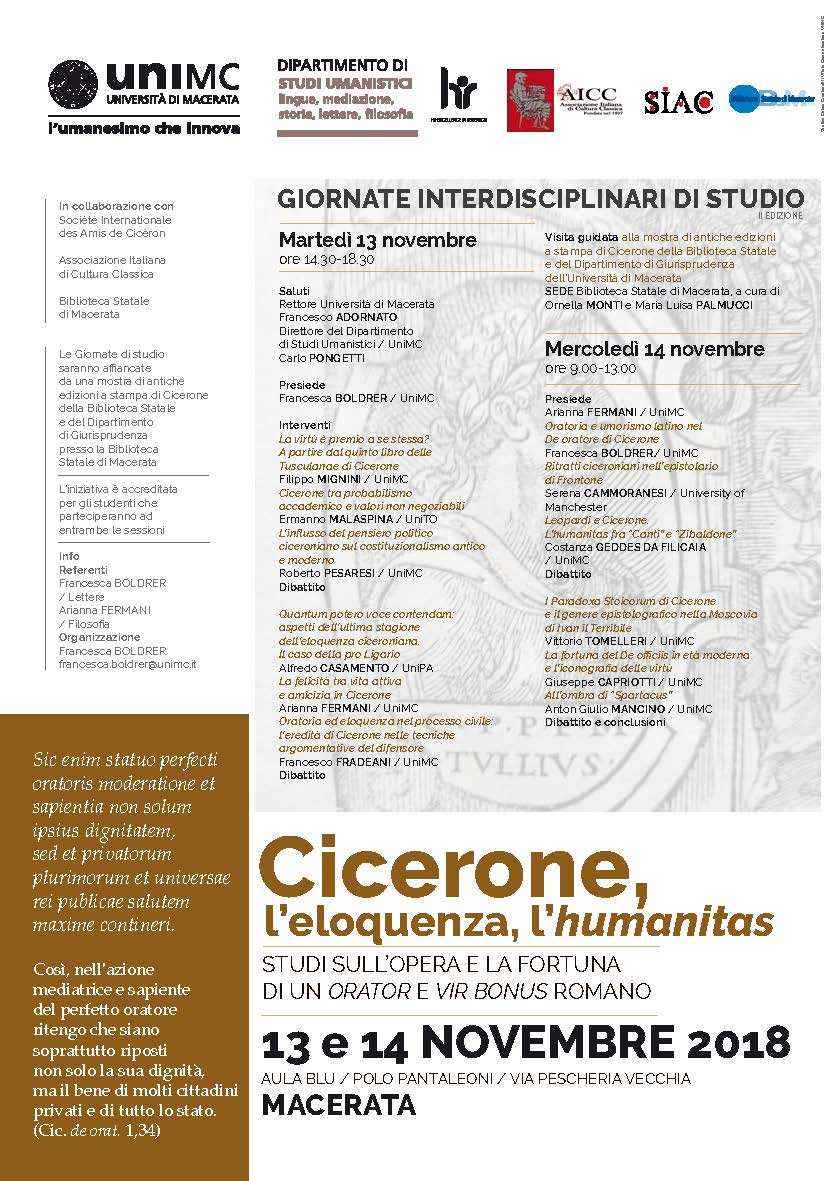Oratoria e umorismo latino in Cicerone: idee per l’inventio tra ars e tradizione - Oratory and Latin Humour in Cicero: Inventio between Ars and Tradition
DOI:
https://doi.org/10.13135/2532-5353/4127Abstract
This paper studies the significance of humour in Roman oratory, a theme dear to Cicero, who claimed expertise in it, and central to book 2 of the De oratore. In a long passage of the work (§§ 216-290), Cicero offers a detailed and systematic account of inventio that fleshes out the sketch presented in the Rhetorica ad Herennium. I argue that Cicero treats this controversial topic in Roman oratory with a sensitivity to the broad range of differing viewpoints held by established orators (including his own teachers). He does so by expertly managing the fine distinction between innovation and tradition, between Greek theoretical works and anthologies of Latin jokes (some of which were compiled by members of illustrious gentes), between utilitas and humanitas.
Il contributo intende approfondire l’importanza dell’umorismo nell’oratoria romana, un tema caro a Cicerone, che ne era esperto, e centrale nel II libro del De oratore. In un’ampia sezione dell’opera (§§ 216-290) l’autore offre un’esposizione dettagliata e sistematica a conclusione dell’inventio, superando largamente gli scarni spunti presenti nella Rhetorica ad Herennium. L’argomento, singolarmente controverso sul piano retorico nel mondo romano per questioni tecniche (ars) e di decorum, viene affrontato da Cicerone con abile dialettica tra diverse e mutevoli opinioni, attribuite ad autorevoli e arguti oratori e ai suoi maestri, ricercando un prudente equilibrio tra innovazione e tradizione, tra trattati greci teorici e raccolte di facezie latine (risalenti anche a membri delle gentes più illustri), tra utilitas e humanitas.
La contribution vise à approfondir l’importance de l’humour dans l’art oratoire romain, un thème cher à Cicéron, qui en était un expert, et au centre du deuxième livre du De oratore. Dans une grande partie de l’ouvrage (§§ 216-290), l’auteur propose une exposition détaillée et systématique à la conclusion de l’inventio, dépassant de loin les maigres indices présents dans la Rhetorica ad Herennium. Le sujet, singulièrement controversé sur le plan rhétorique dans le monde romain pour les questions techniques (ars) et de decorum, est abordé par Cicéron avec une dialectique intelligente entre des opinions différentes et changeantes, attribuées aux orateurs influents et pleins d’esprit et à ses maîtres, à la recherche d’un équilibre prudent entre innovation et tradition, entre traités théoriques grecs et recueils de facéties latines (remontant aussi aux membres des plus illustres gentes), entre utilitas et humanitas.
Downloads
Downloads
Published
How to Cite
License
Authors who publish with this journal agree to the following terms:
- Authors retain copyright and grant the journal right of first publication with the work simultaneously licensed under a Creative Commons Attribution License that allows others to share the work with an acknowledgement of the work's authorship and initial publication in this journal.
- Authors are able to enter into separate, additional contractual arrangements for the non-exclusive distribution of the journal's published version of the work (e.g., post it to an institutional repository or publish it in a book), with an acknowledgement of its initial publication in this journal.


 Ciceroniana On Line is recognised by ANVUR (the National Agency for the Evaluation of the University System and Research) as a CLASS A journal for the Sciences of Antiquity, Philology, Literature and History of Art (
Ciceroniana On Line is recognised by ANVUR (the National Agency for the Evaluation of the University System and Research) as a CLASS A journal for the Sciences of Antiquity, Philology, Literature and History of Art ( The journal is included in DOAJ. The DOAJ listing of the journals is available at
The journal is included in DOAJ. The DOAJ listing of the journals is available at  The journal is indexed in
The journal is indexed in  The journal has been included in ERIH PLUS. The ERIH PLUS listing of the journals is available at
The journal has been included in ERIH PLUS. The ERIH PLUS listing of the journals is available at 

